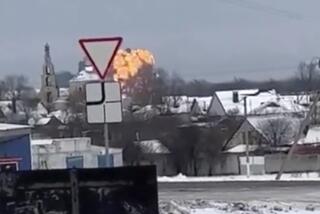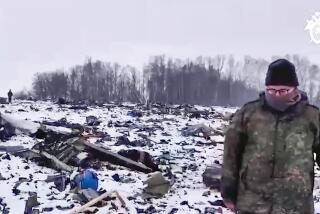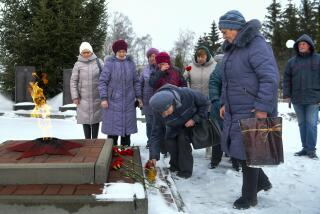In Russia, conflicting theories over passenger jet crash in Sinai
Russian political and aviation authorities on Monday advanced conflicting theories on the cause of a deadly charter jet crash over Egypt’s Sinai Peninsula, with some ruling out pilot error and mechanical failure to suggest the Metrojet Airbus A321 was brought down by a terrorist bomb or missile.
U.S. intelligence and other international experts expressed skepticism that the aircraft flying Russian vacationers home to St. Petersburg from a Red Sea resort could have been downed by Islamist militants but added that no theory could yet be ruled out.
All 217 passengers and seven crew members on board were killed when the jet dropped from radar screens 23 minutes after takeoff from Sharm el Sheik, a southern Sinai Peninsula beach resort popular with Russians seeking to escape their harsh winter.
NEWSLETTER: Get the day’s top headlines from Times Editor Davan Maharaj >>
Recovery workers combing a debris field of more than seven square miles had collected most of the victims’ remains by nightfall Monday, Egyptian government officials reported. The first 144 bodies were flown by a Russian Emergency Situations Ministry plane to St. Petersburg’s Pulkovo Airport, and the rest were expected to be repatriated before the end of the day, Russian media reported.
A multinational team of aviation experts was examining the “black boxes” -- the data and cockpit voice recorders -- recovered Saturday from the crash site. The forensic investigators from Russia, Egypt, France and Ireland -- the latter two representing the Airbus manufacturer and country of registry, respectively -- issued no immediate reports on what is believed to have caused the 18-year-old jet to break up in flight at about 31,000 feet and plunge to the ground.
Speculation of a terrorism role in the disaster was spurred in part by a claim Saturday by a Sinai militant group affiliated with Islamic State that it had brought down the plane. The Wilayat Sinai group, also known as Ansar Bayt al Maqdis, or Partisans of Jerusalem, posted a grainy video on Twitter shortly after the crash that appeared to show a jetliner exploding in the sky and falling in smoldering pieces.
Although a Malaysia Airlines jet was shot down from an altitude of 33,000 feet over Ukraine on July 17, 2014, presumably by separatist militants armed with sophisticated Russian-made anti-aircraft missiles, the Sinai militants aren’t known to possess armaments capable of such an attack.
Nevertheless, the possibility of a ground-to-air missile attack by militants prompted four major airlines and a regional carrier to divert their aircraft from flying over the Sinai Peninsula. Lufthansa, Air France-KLM, Qatar Airways and Emirates Airlines announced they would steer clear of the region, as did the FlyDubai airline of the United Arab Emirates.
Russian Transport Minister Maxim Sokolov, who flew to Egypt on Saturday to take part in the investigation, dismissed the Wilayat Sinai claim as “inaccurate,” though he said Monday that little conclusive information had been gleaned so far.
U.S. Director of National Intelligence James Clapper said at a Washington news conference: “It’s unlikely, but I wouldn’t rule it out. We don’t have any direct evidence of any terrorist involvement yet.”
However, Metrojet officials appeared eager to steer speculation in the direction of the Islamist militants, who have threatened to retaliate against Russia for its role in an international air campaign targeting Islamic State.
“The plane was in excellent condition,” said Alexander Smirnov, deputy general director of Metrojet’s parent company, Kogalymavia. “We rule out a technical fault and any mistake by the crew.”
Smirnov said the aircraft fell from cruising altitude “in an uncontrolled flight -- that is, it was not flying but falling.”
Some private aviation experts gave credence to the theory that the Metrojet plane was destroyed by terrorists.
“Nothing except an explosion on board can cause a complete and immediate power outage in a modern plane, which has lots of generators which could help steer the plane even if all the engines suddenly died,” former test pilot and cosmonaut Magomed Tolboyev told The Times.
Even if the Sinai militants lack the materiel to down an aircraft flying at high altitude, a bomb could have been carried on board or explosives planted in an exterior hatch while the aircraft was on the ground, he said.
The head of the Russian Federal Air Transport Agency told Rossiya-24 state television that it was premature to draw conclusions on the crash’s cause but that evidence gathered so far points to the plane breaking up in midair.
“All signs prove that the structure of the plane disintegrated in the air at high altitude,” said Alexander Neradko.
Russian and Egyptian news media raised the possibility of lapsed maintenance or flight crew morale problems.
Kogalymavia, the Metrojet parent company, had been experiencing financial difficulties as a result of Russia’s ongoing economic crisis, prompting the charter operators to withhold wages to employees for the last two months and allowing a maintenance contract with an Egyptian company to expire three months ago, according to reports by Russia’s Tass news agency and the Egyptian daily Al Masry al Youm.
Kogalymavia officials confirmed at their Moscow news conference that wages had not been paid but denied that safety practices were compromised.
Times staff writers Brian Bennett in Washington and Sergei L. Loiko in Moscow contributed to this report.
Follow @cjwilliamslat for the latest international news 24/7
ALSO
Russian plane broke apart high above the Sinai Peninsula, official says
Should U.S. tolerate foreign dictators? Issue splits Republican candidates
North Korean defector trained in propaganda art now uses it to mock rulers
More to Read
Sign up for Essential California
The most important California stories and recommendations in your inbox every morning.
You may occasionally receive promotional content from the Los Angeles Times.











